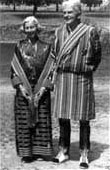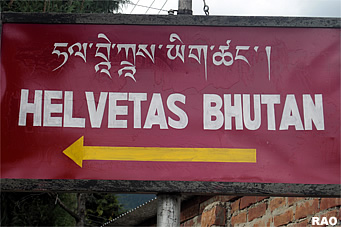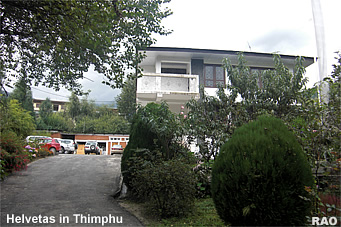 |
Helvetas |
Swiss
Development Projects |
 |
 |
Bhutan's
Development |
|
 |
Bhutan's Development |
|
|
 |
|
Cooperation
Bhutan - Switzerland
|

|
| 2000:
25 years of Bhutan-Swiss cooperation |

|
October
2000
 |
| As
Helvetas celebrates its 25 years in Bhutan, in retrospect, the relation
between Bhutan and Switzerland has thrived from a personal friendship between
the third King of Bhutan and a Swiss businessman, Mr. Fritz Von Schulthess,
to one of the largest bilateral cooperation Bhutan has today.
The
two countries have seen their relations flourish from a modest Swiss assistance
in milk and cheese production at Maneting (a day's walk from Phobjikha,
Wangduephodrang) in the early 1970s to the recent commitment of Nu 54 million
for the construction of the bridge over the Puna Tsang Chu at Wangduephodrang.
According to Mr. E. Werner Kuelling, secretary general of the Helvetas'
head office in Zurich, the bridge will be a "milestone" in the partnership
between the two countries. |
|
The
construction of the bridge begun a month ago is scheduled for completion
by the end of next year. "The bridge is symbolic in the perspective that
it connects people, and strategically important as it connects the east-west
national highway," said Mr. Dieter Zuercher, who took over as the resident
coordinator of Helvetas about a year and a half ago. "I took over
a well-established programme and therefore it was a big challenge. The
relation between the two countries then was excellent and is still very
excellent today," he added. Mr. Schulthess, since his first visit
to Bhutan in 1952, made further 17 sojourns in Bhutan developing a
close bond with the Bhutanese people. He was awarded the Druk Yezhen Wangyal
medal.
Bilateral
Cooperation
Mr.
Schulthess privately started development initiatives in the mid-1960s and
established the Foundation Pro Bhutan in 1972 to intensify assistance within
broader perspective, and for raising fund in Switzerland. In July 1975,
the programme of the Foundation was handed over to Helvetas, and by 1980s
the Swiss Agency for Development and Cooperation (SDC) - a part of the
federal department of foreign affairs of the government of Switzerland
- started to support the Helvetas programme.
In
1983, Helvetas and SDC jointly opened a coordination office in Thimphu.
The first general agreement on development cooperation was signed between
the royal government and Helvetas. As a result, several projects in Bumthang
were expanded to national level (livestock and fodder), and many new projects
were launched including the National Potato Project, the construction of
hospital at Bumthang, and the Integrated Forestry Development Project in
Bumthang.
The
first coordinator, Mr. Ernst Reinhardt, arrived Bhutan in April 1983 and
the immediate challenge for him was "to strengthen the ties of friendship
built on good practise, credibility and mutual respect." "Would I be able
to balance the value systems of the two partner countries in our work.?"
He said that coming to Bhutan was a dream come true to apply his knowledge
to a developing country after visiting many of them earlier. "The volume
of the Bhutan-Swiss cooperation now is 10 times higher than it was 25 years
ago," said Mr. Kuelling, who has been the secretary general for the last
20 years. Mr. Kuelling has visited Bhutan eight times and found it "a real
pleasure."
"The
highlights of my visits were always the audiences and exchange of views
with His Majesty," he added, "who, in my eyes, is one of the most able
leaders I have met in all the 20 countries in Asia, Africa and Latin America
where Helvetas is involved." The credit for the flourishing relation also
goes to Mr. Fritz Maurer, a Helvetas pioneer in Bhutan, who came to the
country in 1969 and now is permanently based in Bumthang, married to a
Bhutanese woman.
The
human resource development has always received high priority throughout
the assisted programs. The capacity of the education system has been greatly
enlarged with the construction of the Teacher Training Institute from 1993
to 1999. The Skill Development Programme began in 1996 with the aim of
self-employment for the early school drop-outs. The renewable natural resources
sector has seen the strongest assistance and is still the most important
sector. Involvement in agriculture has continued for more than 30
years. A new policy to promote the development of farm- households in a
more integrated manner led to the vision of a Natural Resources Training
Institute (NRTI).
The SDC has financed the construction of the NRTI complex
in Lobeysa, while Helvetas has helped build up a teacher cadre, and still
supports the institute in management and training aspects. The Helvetas
and SDC have been involved in building suspension bridges across the country
for more than 15 years. So far, about 350 bridges have been built.
Helvetas
is also restoring an ancient building in Thimphu, to set up a living museum
to preserve the artifacts, skills and tradition of Bhutan. At the
individual level, many Swiss share an attachment with Bhutan, basically
because of the geographical resemblance. Mr. Thomas Schaetti, a businessman,
defined Bhutan as his "second home." "When I visit Bhutan, I suddenly have
time-time to meet friends, time to enjoy Bhutan's precious culture and
nature," he said. "Bhutan makes me reflect on the way we live in Switzerland,
the way our society works, the way we make use and preserve nature. I hope
Swiss people contribute to create a solid foundation for Bhutan's own path
to a world that grows smaller."
The
former resident coordinator, Mr. Peter Koenig, who is presently in the
country said that he carries many memories from Bhutan, notably, when he
had a health problem how everyone showed their concern. "That's one of
the reasons why I came back to Bhutan." On Bhutan being now wired
to Internet, he said that even during his tenure, he had "worked hard"
with other organisations to bring Internet into Bhutan and had informed
the government of the importance of Information Technology. "This
time, I haven't heard a single kid call me Pshilip," he said, recalling
how kids called him Pshilip two years back. The other change he observed
was that he saw less government vehicles on the road after office hours.
Mr.
Zuercher said that Bhutan has a healthy working environment with "dedicated"
civil servants and virtually "no corruption." "Relations have always been
good and I am happy to see that the Swiss support is built on a strong
foundations with lasting efforts," said Mr. Reinhardt. "I hope the two
partners will always be critical, sincere friends."
As
regard to the future of Swiss assistance, a Helvetas document says that
in general response to the improving socio-economic conditions of many
Bhutanese, there may be a gradual shift from classical development assistance
towards a more economic-oriented relationship. Stronger private sector
relations are already developing, such as in the hydropower sector.
The document also says that the farsighted policies of the government,
combined with committed and competent Bhutanese counterparts, and increasing
number of educated civil servants, together with partnership approach of
the projects and programmes have been boons to the success of Swiss assistance
in Bhutan.
However,
it also noted that external assistance does have some problems. It not
only creates high expectations at all levels but also lets the partner
lean back with the attitude that the donor will do everything. In particular,
the limited absorption capacity of the government, due to its size and
cadre, difficult donors' coordination due to donor competition, and unbalanced
regional growth due to concentration of activities in the west, are some
of the impediments to development in Bhutan.
Mr.
Kuelling said that Bhutan was successful in economic and social development
in the last 25 years and that the country-step by step-will be able to
live from its human and natural resources after about 10 years. On the
potential areas for future cooperation, he was of the view that Helvetas
should support more activities in education in general, civic education
and building up the institutions in the civil society, training and support
in the field of culture and safeguarding of national heritage. In the sector
of natural resources, more emphasis will be given to research.
Since
1975, the Swiss assistance has invested Swiss Franc 120 million in the
developmental activities in Bhutan. Helvetas was founded in 1955 as the
first non-governmental organisation for development cooperation in Switzerland
and has 30,000 members who also donate to the organisation.
| Contributed
by KUENSEL, Bhutan's National Newspaper |
 |
top
|
National Order of Merit in Gold to Fritz Maurer
|
 |
For their exemplary service in education, His Majesty conferred the National Order of Merit (Gold) to 112 senior teachers from across the country.
A cheese specialist and the founder of bee keeping in Bumthang, Fritz Maurer was also among the National Order of Merit (Gold) recipients.
On behalf of the teachers, education minister Thakur S Powdyel said the moment was truly a high point in the history of education in the country.
"I sat there with a lump in my throat as His Majesty, our beloved King, informed the nation of the centrality of education and acclaimed the contribution of teachers to the task of nation building," he said. "It was as if I have lived all my life for the moment."
Lyonpo also said the awards conferred on an unprecedented number of educators were the finest gift to the education community even as the nation celebrated the centenary of modern education.
"This royal affirmation of the importance of the noble sector, a King's trust in the power of teachers' work constitute the best reason for educators to call up their finest gifts to serve and to enlighten," he said.
| This
article was contributed by KUENSEL, Bhutan's National Newspaper, December 2012 |
 |
| more information on Bhutan |
 |
|







